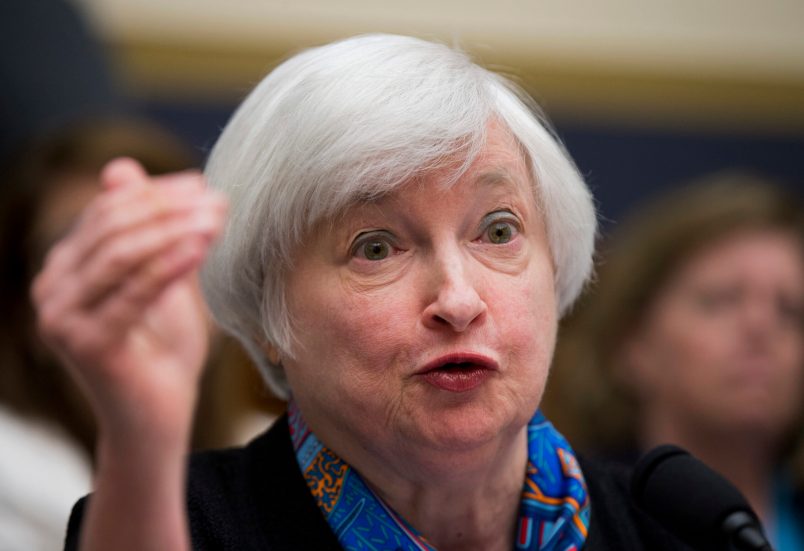If the White House is forced to cite the 14th Amendment as it navigates House Republicans’ debt-ceiling hostage-taking gambit, we will have entered a “constitutional crisis,” Treasury Secretary Janet Yellen said on Sunday, days after President Biden left the option open as some members of Congress continue to signal they may well shoot the hostage.
“Our priority is to make sure that Congress does its job,” Yellen said on ABC News’ “This Week” when asked about it. “There is no way to protect our financial system in our economy, other than Congress doing its job and raising the debt ceiling and enabling us to pay our bills and we should not get to the point where we need to consider whether the President can go on issuing debt. This would be a constitutional crisis.”
The part of the 14th Amendment in question reads, “validity of the public debt of the United States, authorized by law, including debts incurred for payment of pensions and bounties for services in suppressing insurrection or rebellion, shall not be questioned.”
As the day when House Republicans may push the country to default on its debts draws closer, legal scholars have floated the theory that the 14th Amendment essentially declares the debt ceiling unconstitutional. Were the White House to embrace this argument, it might ignore Congress and continue to pay the U.S.’s bills. The move would almost certainly start a lengthy legal fight.
Anchor George Stephanopoulos repeatedly asked Yellen if Biden invoking the 14th Amendment was on the table, and the Treasury Secretary repeatedly replied that the responsibility to resolve Congress’ self-imposed crisis lies with Congress.
“I’m still not exactly clear on whether it’s on the table or off the table,” Stephanopoulos asked. “Is it a break glass in case of emergency option?”
“Look, I don’t want to consider emergency options,” Yellen said. “What’s important is that members of Congress recognize what their responsibility is, and avert what will surely be, regardless of how it’s handled, what option is used to handle it, an economic and financial catastrophe.”
“It sounds like you’re saying you don’t want to but you may have to,” Stephanopoulos continued.
“Well… what to do if Congress fails to meet its responsibility, there is simply no good options. And the ones that you’ve listed are among the not good options,” Yellen replied.
Yellen’s description of invoking the 14th Amendment as a dire option comes just days after Biden said that he’s not ready to do so, leaving the option on the table ahead of a long-awaited meeting with House Speaker Kevin McCarthy (R-CA).
“I’ve not gotten there yet,” Biden told MSNBC host Stephanie Ruhle in an interview that aired on Friday.
Biden and McCarthy — alongside Senate Majority Leader Chuck Schumer (D-NY), Senate Minority Leader Mitch McConnell (R-KY) and House Minority Leader Hakeem Jeffries (D-NY) — are scheduled to meet on Tuesday, the first time since Feb 1., to discuss the looming debt ceiling default and spending.
The meeting comes as Yellen announced last week that the country could default on its debt as early as June 1 if the borrowing limit is not raised.







MTG will dictate how the debt ceiling issue is resolved.
We are being prepped for the real possibility of Biden invoking the 14th amendment. That would be a good thing, after an initial overreaction, but we can then put this ridiculous repeat scenario behind us for good.
Republican action on this will entirely depend on their short-term outlook on how i will influence the next election.
Don’t make him angry. You wouldn’t like him angry.
If McCarthy litigates the invocation of the 14th before SCOTUS are you confident they would find for Biden?
I think the GOPers do not understand economics or debt. They wanna see what happens with a default. They think its just ink on paper.